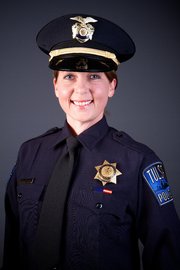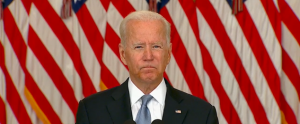
New York Times: The white police officer who fatally shot an unarmed black driver here last week as he stood outside his vehicle overreacted during a confrontation captured on video and was charged on Thursday with first-degree manslaughter, the authorities said.
According to court documents, the officer, Betty Jo Shelby, 42, was overcome with fear that the man, Terence Crutcher, 40, who was not responding to her commands and was walking away from her with his hands up, was going to kill her.
An investigator with the Tulsa County district attorney’s office said in an affidavit that Officer Shelby became “emotionally involved to the point that she overreacted” and fired her weapon even though she “was not able to see any weapons or bulges indicating” that Mr. Crutcher had a gun.
Prosecutors have charged the officer with committing manslaughter “in the heat of passion.” Oklahoma law defines such passion as a strong emotion, such as fear or anger, that exists to such a degree in a defendant that it affects “the ability to reason and render the mind incapable of cool reflection.” Those found guilty of first-degree manslaughter face a sentence of no fewer than four years in prison.
Officer Shelby, a Tulsa police officer since 2011, has been on paid administrative leave. The authorities said that a warrant had been issued for her arrest and that arrangements were being made for her to surrender to sheriff’s officials.
Mr. Crutcher was unarmed when he was shot, and no weapons were found in his vehicle, officials said. The Tulsa County district attorney, Stephen A. Kunzweiler, said he filed the charge against Officer Shelby after reviewing video of the shooting from both a patrol car’s dashboard camera and from a helicopter that had responded, as well as 911 calls, witness interviews and other evidence.
Court documents state that based on Mr. Crutcher’s noncompliance, Officer Shelby’s fear “resulted in her unreasonable actions” that led her to fire her weapon. Mr. Crutcher died from a single gunshot wound to the chest.
The shooting is one of a string of deaths of black people at the hands of the police that have stoked outrage around the country. The unrest and violence in Charlotte, N.C., that has followed a police killing of a black man in that city were part of the backdrop in Tulsa. In a statement, Gov. Mary Fallin of Oklahoma praised city leaders, law enforcement officials “as well as the citizens of Tulsa for keeping peace and order during this difficult time.” She asked residents to keep both the Crutcher and Shelby families in their prayers.
“No matter how you feel about the prosecutors’ decision in this case, I hope Oklahomans will respect the views of your friends and neighbors, because we still have to live peacefully together as we try to make sense of the circumstances that led to Mr. Crutcher’s death,” she said.
Last Friday, according to court documents, Officer Shelby was responding to a domestic violence call when she passed an intersection in north Tulsa and noticed Mr. Crutcher standing in the street, and his vehicle partly blocking traffic lanes.
She was alone in her patrol car, and she stopped and approached Mr. Crutcher’s vehicle. Officer Shelby asked Mr. Crutcher if the vehicle belonged to him and whether it was disabled, but he only mumbled to himself and did not answer any of her questions, the district attorney’s investigator wrote in an affidavit.
According to the affidavit, Mr. Crutcher kept putting his hands in his pockets, even as the officer told him to show his hands. Mr. Crutcher walked toward his vehicle with his hands up and refused to comply with her orders to stop. She pulled her weapon as he walked to the driver’s side door, the investigator wrote, and another officer arrived and told Officer Shelby he had his Taser ready.
Mr. Crutcher reached into the driver’s side front window, the investigator wrote, and then the officer fired his Taser and Officer Shelby fired her gun.
Lawyers for Mr. Crutcher’s family dispute some of the authorities’ account of the shooting. They said the window of Mr. Crutcher’s vehicle was up, not down, and so he could not have reached into the vehicle before he was shot. The two videos of the confrontation do not show the actual moment of the shooting.
Benjamin L. Crump, one of the lawyers for Mr. Crutcher’s relatives, praised the filing of a criminal charge against the officer.
“Through the vivid slow motion video witnessed around the world, America once again witnessed the tragic death of another person of color, gunned down senselessly by an officer who swore to protect and serve,” Mr. Crump said in a statement. “Make no mistake, it was clear from the beginning that charges were necessary in this case.”
Federal prosecutors and F.B.I. agents are conducting a separate investigation into whether Mr. Crutcher’s civil rights were violated.
The Rev. Al Sharpton said the charge against Officer Shelby was “a swift step in the right direction as we pursue justice in the death of Terence Crutcher.” But Mr. Sharpton, who was asked by Mr. Crutcher’s relatives to come to Tulsa on Tuesday, said he wanted the investigation into the actions of all the officers at the scene to continue.
In downtown Tulsa, outside the courthouse where the district attorney announced the filing of charges against Officer Shelby, a group of protesters gathered, waving signs reading “Black Lives Matter” and “This stops now.” Three Tulsa cosmetology students who stood holding signs said they wanted the officer to be charged not with manslaughter, but with murder.
“Manslaughter is when you get drunk and you hit someone with your car,” said Mia Hogsett, 27. “It’s not when you point your gun at someone and know that that trigger can kill a person. She was afraid, but she was trained. She was trained to be in that situation.”




